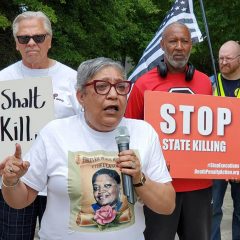(RNS) — The U.S. Supreme Court has ended its work for the session, but this week marks the anniversaries of two landmark decisions on the death penalty. On June 29, 1972, the Supreme Court’s Furman decision struck down all death penalty laws in the country. July 2, 1976, marks the 49th anniversary of the Gregg decision, which allowed the resumption of executions. These cases have impacted me and my family significantly, because the man who killed our loved ones still sits on death row awaiting his punishment.
It has been a decade since my mother, Ethel Lance, along with my cousins Susie Jackson and Tywanza Sanders and six others were gunned down in a mass shooting at Mother Emanuel AME Church in Charleston, South Carolina, in 2015. In the past weeks, I, my family and many others have been marking the 10th anniversary of that horrific day.
I will never forget the moment when I got the phone call that none of us want. My loved ones had been murdered with guns and ammunition the killer was able to easily purchase just weeks ahead of his crime.
It was another mass shooting, but it was different, because this time it was my people. The motive was racism and hatred. This is how it became a federal crime and why that murderer remains on federal death row.
Dylann Roof wanted to start a race war, but I feel like there is already such a war going on, and it plays out in our criminal legal system. Quite frankly, my case is an anomaly, because the glaring truth about the death penalty is that race plays a big part in who gets a death sentence.
In most cases, the race of the victim is a very significant factor in deciding who gets a death sentence — much more than the race of the killer. We can see that undeniably just in the 25 executions carried out thus far in the United States this year.
According to the Death Penalty Policy Project, all but one of the last 25 executions in the United States were in cases where the victim(s) were white people, even though people of color are victims of murder about half the time. This bears out across all 1,632 executions since the death penalty was reinstated. Nearly 80% of all U.S. executions in the current death penalty era involved exclusively white victims.
I believe the murder of my loved ones resulted in a death sentence because of the high-profile nature of the crime and the fact that it was racially motivated. But if theirs had been a lower profile, run-of-the-mill random shooting, or a robbery/murder with fewer victims, most people would never have heard about it, and it very likely would not have resulted in a death sentence.
We’ve seen this recently in sentencing and charging decisions under the Trump administration’s Department of Justice. Attorney General Pam Bondi proudly announced that the DOJ will seek a federal death sentence for Luigi Mangione, who is accused of assassinating a white corporate executive in a state that does not have the death penalty. However, the DOJ decided not to seek the death sentence for the racially motivated El Paso Walmart shooter, who traveled hundreds of miles just to be assured that he could “kill as many Mexicans as possible.” Nearly two dozen people died for shopping while brown.
I had never really thought about the death penalty before it touched me so closely, but I now oppose it in all cases. Learning about the unfairness of racism in the system is both personal and academic, but because our killer is on death row, I can’t heal.
When the government puts someone on death row, what they are doing is sentencing the victim’s family to death too. We wake up every day waiting for that healing to begin, yet we have been told that we get to wait until they kill the guy, and then we will feel better.
Every time there is an appeal, and every time his name is in the news, we family members of victims are forced to relive the pain of the day our loved ones were murdered. That’s not right. If society would just throw away the key on such killers, we can begin our healing process much sooner.
I believe in love, redemption and forgiveness and all of that. I am a Christian pastor, but it is hard. I’m not going to lie — I want Dylann Roof dead. I am not going to shed a tear for the racist man who killed my family members when he finally dies, but I do not want to be a part of killing him.

The Rev. Sharon Risher speaks against the death penalty. (Photo courtesy of DeathPenaltyAction.org)
When I stand in front of the U.S. Supreme Court building and see those words carved into the front of it — EQUAL JUSTICE UNDER LAW — I know that’s an aspiration. But from the day this country was founded that aspiration has been a lie. We all know how broken and unfair and unfixable the death penalty system is. That is why we must abolish capital punishment once and for all.
(The Rev. Sharon Risher is board chair of Death Penalty Action and a member of Journey of Hope From Violence to Healing, an organization of murder victim family members who oppose the death penalty. The views expressed in this commentary do not necessarily reflect those of Religion News Service.)



